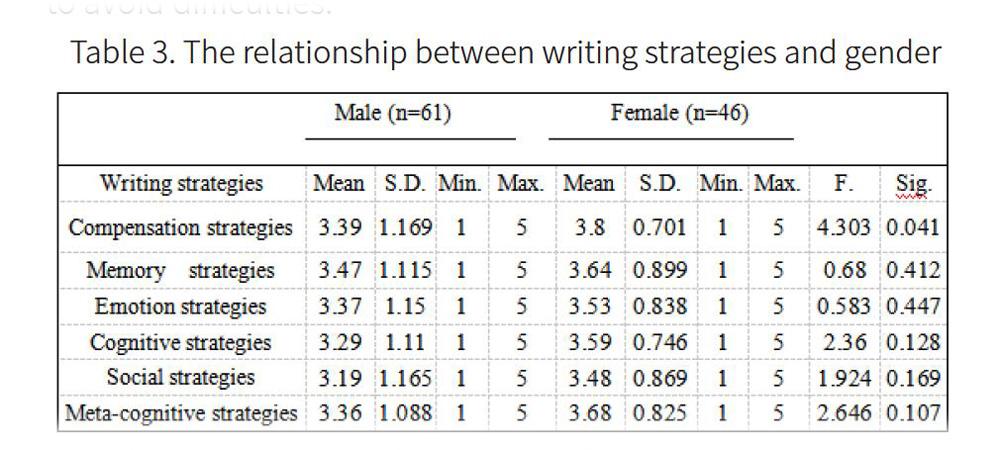Analysis of writing strategies of EFL writers at the secondarylevel
2019-11-28郑丽妍



【Abstract】The present study reveals differences in writing strategies among secondary EFL (English as a foreign language) writers by investigating the relationship between the writing strategies and EFL writers language proficiency, gender and writing quality. Data was collected from 97 secondary EFL writers from three provinces in China by questionnaire. Data revealed that secondary students used most the compensation strategies while used least the social strategies but no significant difference was found between writing strategies and language proficiency. Females significantly adopt more compensation strategies than males. In addition, results also indicated that writers who produced high quality essays used more cognitive strategies than writers who dont.
【Key words】writing strategies; EFL writers; secondary education
【作者簡介】郑丽妍,北京科技大学外国语学院。
1. Background of the study
EFL writing strategies have been the important topics in linguistics. In China, however, researches on English writing strategies are in the initial stage (Wen, 2004). Additionally, English education in China neglects the cultivation of writing strategies (Tan, 2019), which causes students ignorance of learning techniques for improving writing scores. However, foreign research on the relationship between writing strategies and writing proficiency has shown that writing strategies are closely related to writing proficiency (Chien, 2012; Rui et al., 2014; Sasaki, 2002; Victori, 1999). Thus, it is of vital importance to study EFL writing strategies in China. This study aims to reveal the relationship between writing strategies and language proficiency, gender and writing quality in EFL secondary writing.
Based on the Oxford (1990)s language learning strategy scale (SILL) and the Petic and Czarls writing strategy questionnaire, the present study compiles the questionnaire for the secondary EFL writing strategies. The following three research questions were addressed:
(1) What is the relationship between EFL writing strategies and language proficiency assessed by grade ( Junior high school and Senior high school) ?
(2) Is there a significant difference in EFL writing strategies between males and females?
(3) What is the relationship between EFL writing strategies and writing quality evaluated by English writing scores?
2. Research Design
(1) Measures
The questionnaire consisted of the basic information of the students and three-part writing strategies, pre-writing, while-writing and post-writing strategies. In total, it covered six aspects, memory, cognitive, compensation, meta-cognitive, emotional and social strategies respectively. Five-point scale was used in which 1 refers to never, 2 for seldom, 3 for sometimes, 4 for often, 5 for always. Reliability analysis was conducted on the questionnaire (see Table 1. below). It showed that the questionnaire on writing strategies had high internal consistency.
Table 1. The reliability of the questionnaire
Writing strategies Cronbachs Alpha
Compensation strategies 0.767
Memory strategies 0.606
Emotional strategies 0.880
Cognitive strategies 0.934
Social strategies 0.850
Meta-cognitive strategies 0.875
The whole writing strategies 0.980
(2)Participants
The present study targeted at 34 junior high school students and 63 senior high school students including 51 males and 46 females from Shandong, Hebei, and Tianjin. A total of 97 effective questionnaires were received.
(3)Procedures
The online questionnaire was sent to students and was collected within 10 minutes. The present study used software SPSS to conduct descriptive analysis of the data to show the overall features of writing strategies usage among EFL secondary writers. One-way ANOVA was conducted to discover the relationship between writing strategies and language proficiency, gender. Pearson Correlation was performed to explore the relationship between writing strategies and writing quality assessed by writing scores.
3. Results and discussion
(1)Writing strategies and writing proficiency assessed by grades
First, this research explored the overall features of writing strategies in EFL secondary level, by Descriptive analysis, and it found that the mean of writing strategies was 3.4, which suggested that EFL secondary writers sometimes or often used writing strategies. Data also indicated that compensation strategies (e.g. the use of synonyms to replace unknown words) were the most used one while social strategies (e.g. raised question when met difficulties in writing) were the least used one for EFL secondary writers with the mean 3.6 and 3.3 respectively.
Next, this study conducted One-way ANOVA to investigate the relationship between writing strategies and language proficiency as evaluated by grades on the premise that junior high school students were classified EFL writers with low language proficiency while senior high school students were with high language proficiency. The results were shown in Table 2. No significant differences were found between writing strategies and language proficiency assessed by grades. It demonstrated that junior high school students showed no significant differences with senior high school students in using writing strategies.
Table 2. The relationship between writing strategies and language proficiency
(2) Writing strategies and gender
The study investigated whether there was significant difference between male and female in the using of writing strategies. As shown in Table 3, females used more compensation strategies than males and this difference was significant. It indicated that female EFL secondary writers are more inclined to choose their interested topics for writing and adopt round-about methods such as synonyms replacement to avoid difficulties.
Table 3. The relationship between writing strategies and gender
(3) writing strategies and writing quality evaluated by writing scores
To explore whether there is significant relationship between writing strategies and writing scores, the research collected the twelfth grade EFL writers answers. They were in the same class in Shandong province and were asked to write down the English writing scores of the final exam. In total, 34 valid data were collected. By Pearson Correlation, it found that EFL secondary writers who got higher writing scores used more writing strategies compared with those who got lower scores (see Table 4). However, their differences were not significant except for cognitive strategies. This proved that EFL writers who produced essays with high writing quality tended to use more cognitive strategies (e.g. strategies of read-back, translation, review, outline, cohesion and coherence).
Table 4. Correlation between writing strategies and writing scores
Writing strategies r
Compensation strategies .145
Memory strategies .256
Emotion strategies .229
Cognitive strategies .733**
Social strategies .171
Meta-cognitive strategies .149
4. Conclusion and Implications
This study explored the relationships between writing strategies and language proficiency, gender, and writing quality. Results revealed that EFL writers at secondary level with different language proficiency showed little differences in using writing strategies. An interesting finding was that females used more compensation strategies than males in writing. Data also suggested EFL writers who got high writing scores tended to use more cognitive strategies.
Findings of this study have some implications for L2 writing pedagogy. The present study has revealed the importance of using cognitive strategies as they are significantly related to writing scores. Thus, teachers should be advised to teach and instruct secondary EFL writers to use more cognitive strategies in writing. For example, the use of rhetorical devices, coherence and cohesion and syntactic diversity in EFL writing are all effective methods to improve students writing scores.
References:
[1]覃歡.初中生英语写作策略使用现状调查研究[D].广西师范大学,2019.
[2]文秋芳,王立非.中国英语学习策略实证研究20年[J].外国语言文学,2004(01):39-45.
[3]Chien S C . Students use of writing strategies and their English writing achievements in Taiwan[J]. Asia Pacific Journal of Education, 2012, 32(1):93-112.
[4]Oxford R L , Ehrman M E . Adults language learning strategies in an intensive foreign language program in the United States[J]. System, 1995, 23(3):359-386.
[5]Rui B, Hu G, Gu P Y. The Relationship Between Use of Writing Strategies and English Proficiency in Singapore Primary Schools[J]. The Asia-Pacific Education Researcher, 2014, 23(3):355-365.
[6]Sasaki M. Building An Empirically-Based Model of Efl Learners Writing Processes[M]// New Directions for Research in L2 Writing. 2002.
